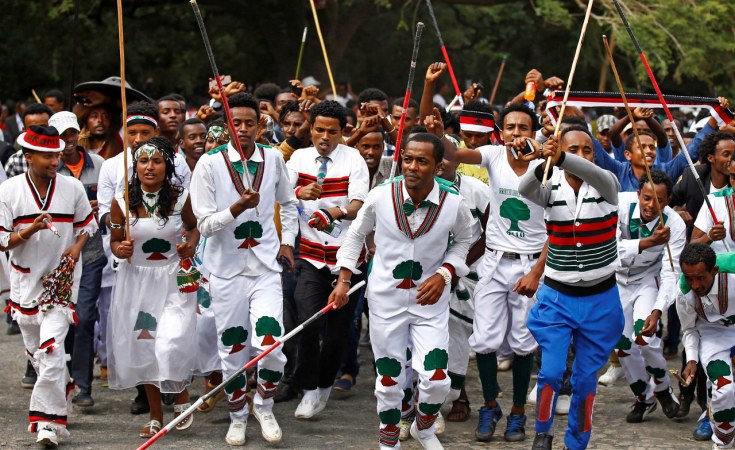CHINAKSEN, Oromia, Ethiopia — "I used to be a wealthy woman. I had farmlands, horses, cows and even a shopping centre. The conflict has ravaged my life. Now, I am destitute," said Ugosa Hassan, who is living on a makeshift site on the outskirts of Chinaksen, in Ethiopia's state of Oromia.
The 60-year-old mother of five is one of thousands of families displaced by the inter-communal conflict over water and grazing land between the Somali and Oromia regions. Tensions have intensified due to the effects of the drought since October last year.
Ms. Hassan takes frequent refuge at the Women and Girls' Safe Space, run by the International Medical Corps with support from UNFPA.
"Every time I come to the safe space and see my basket hanging on the wall, I feel proud of myself. It brings some comfort to my life," said Ms. Hassan. "Life is not easy, but with the support of the social workers and other women I met here, I have found some solace."
Inter-communal violence and the worst drought in decades have caused severe loss of life and livelihoods, driven internal displacement, and increased humanitarian needs in Ethiopia's southern and western regions, including Oromia.
In Oromia region, the authorities have appealed for humanitarian assistance for 3.4 million people affected by the drought. In East and West Hararghe Zones, 24 woredas are severely impacted, with an estimated 1.3 million people in need of humanitarian assistance.
An entry point to GBV services
Women and girl-friendly spaces offer physical and emotional safety, information and support, activities, network building and relationships with peers.
"In Chinaksen, women do not have any other space to gather together, socialize, discuss issues relevant to them or even forget about their distress in life. Here, displaced and host community women can support and learn from each other," said Maryam Mukhatar, a cultural mother supporting the integration of displaced women in the community.
With no other means to help them survive, women like Ms. Hassan fear for their families' future. Women and girls affected by conflict and drought are at a heightened risk of sexual and physical violence and coercion. Child and forced marriages spike during crises, as protection mechanisms fail and households use early marriage as a financial coping mechanism.
"The Women and Girls' Safe Space is helping to counteract child marriage. Girls feel free to speak, report cases and find help, including during the awareness sessions created for the community and adolescents," said Amina Ali, GBV Manager at International Medical Corps.
The safe spaces are co-created with women and adolescent girls caught up in conflict, disasters and displacement, supporting their access to services and reducing their vulnerability to harm, as well as enhancing their empowerment and participation in humanitarian settings.
Ensuring no women or girls are left behind
With the support of the Central Emergency Response Fund (CERF), UNFPA works with the International Medical Corps to provide gender-based violence (GBV) risk mitigation and response services to better protect women and girls affected by conflict and drought in the Oromia region. The response includes maintaining women and girl-friendly spaces, where women can access integrated GBV and sexual and reproductive health services, as well as activities to build skills.
The distribution of dignity kits is also undertaken, and community outreach and information sessions are organized to promote the use of services. The capacity of health and protection service providers has been built at ground level.
Across Ethiopia, UNFPA is supporting 28 safe spaces for women and girls in IDP camps, as well as 21 One-Stop Centres. Critical reproductive health supplies, medicines and equipment have been provided and the capacity of frontline service providers built. To date, nearly 100,000 conflict-affected people have been reached with mental health and psychosocial counselling, as part of a comprehensive GBV response.
Despite all efforts to increase the coverage of GBV services, much support is needed to respond to the needs of women and girls affected by conflict and climate-related shocks in the region.
The UNFPA Humanitarian Response Appeal 2022 calls for nearly $30 million to respond to the urgent protection and health needs of women and girls in eight crisis-affected regions in Ethiopia, including women like Ms. Hassan. To date, nearly 25 per cent of the appeal remains unfunded.


